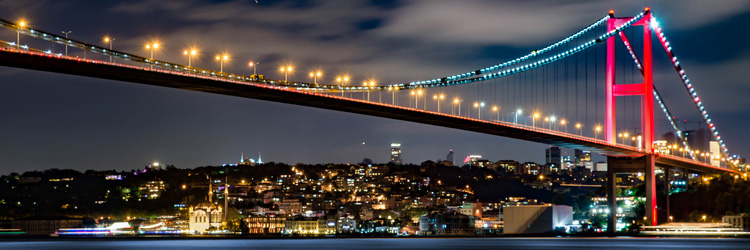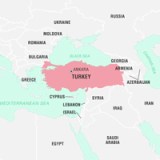The Country Where East Meets West
If you were to describe Turkey in one sentence, this might be the best way to do it. In fact, the country is geographically located between two continents, a larger part of its land (i.e. “Anatolia”) being on Asia and a smaller part (i.e. “Thrace”) on Europe. On top of that, these two continents are divided by the beautiful strait “Bosphorus” within the country’s largest city, Istanbul.

Naturally, this not only makes Turkey an exotic place to visit or live, but it also has strong influences on the culture and the society. Thus, while one can call Turkey purely a Middle Eastern country, the other can easily name it “Western”, depending on where they have been to or whom they have spoken with.
Turkey is a highly populous country. With 85 million people living in Turkey, ranks 17th in the world and 2nd Europe after Russia. There are 81 cities in Turkey in total. Istanbul, Ankara (the capital), Izmir, Bursa and Adana are the major centers of attraction.
Istanbul: The Beating Heart of the Country
The largest city of Turkey is Istanbul with its 16 million inhabitants. From this perspective, it is larger than several European countries like Portugal, Greece, Sweden, or Austria.
This fascinating city has a special significance in the country from many aspects. First of all, about one of every five Turks lives in in this city. Besides, Istanbul is the center of all major commercial, financial as well as cultural activities. Istanbul hosts a very high percentage of company and bank headquarters. Football (soccer) is the most popular sport by a great margin in Turkey and only two teams outside of Istanbul have ever won the national league championship in the whole history.
Cradle of Civilizations
 Anatolia has been home to the oldest known settled civilizations for ages and this has shown a phenomenal continuity. Human habitation in Anatolia dates back to the Paleolithic (Old Stone Age). Hattians, Hittites, Lydians, Armenians, Greeks, Romans and Ottomans were some of the people who ruled this land, with each leaving their own traces behind.
Anatolia has been home to the oldest known settled civilizations for ages and this has shown a phenomenal continuity. Human habitation in Anatolia dates back to the Paleolithic (Old Stone Age). Hattians, Hittites, Lydians, Armenians, Greeks, Romans and Ottomans were some of the people who ruled this land, with each leaving their own traces behind.
It is no surprise that humanity’s oldest known monumental structures were found at Gobeklitepe, in South-East Turkey. The structures are 11,000 years old or more, much older than the Egyptian pyramids and Stonehenge.
Modern Turkey was founded in 1923 from the ashes of the Ottoman Empire following a war of independence. Ottoman Empire was defeated in the World War I that resulted in an invasion of its land by the victorious countries.
Economy and Employment
The characteristic that will best describe the Turkish economy is “full of surprises”. This imposes risks as well as opportunities to businesses.
Turkey is one of those economies where high unemployment has been an important issue that no government has ever been able to overcome. This unfavorable situation on the other hand, represents a significant opportunity for direct selling entities and individual direct sellers who seek individuals for their sales teams.
Doing Business in Turkey
The Turkish legal system regulating businesses is similar to those found in other European countries in many aspects.
Foreign investors are treated equally to Turkish investors, by law. Furthermore, there are no restrictions on foreign shareholding except in a few sectors.
Turkey has a customs union agreement with the European Union (EU). As a result, most industrial products that are in free circulation within the EU are also deemed to be in free circulation in Turkey.
Manufacturing and importing cosmetics and nutritional products are subject to regulations specific to these industries.
Direct Selling in Turkey
Organized direct selling has a 50-year history in Turkey. Many families were introduced to books, encyclopedias and cookware through local companies utilizing this channel to reach customers in ‘70s. This wave was interrupted by a very high inflationary period accompanied by the lack of modern payment methods and a modern telecommunications infrastructure.
While the local entrepreneurs were reluctant to take another step even after these barriers were no longer there, an international company ended up making the first move: In the early ‘90s, the Swedish direct seller Oriflame was rapidly expanding to take full advantage of the changes happening in Eastern Europe and its plans also included Turkey.
After Oriflame’s start in 1992, Avon launched in 1993. They were followed by Amway in 1994 and Herbalife in 1998. Today, quite a few internationals operate in the country with varying levels of success. There also are local direct sales companies such as Farmasi and HuncaLife.
 Factors that pave the way for direct sellers’ success do exist in Turkey: A very efficient banking system with a wide, integrated ATM network, quite high credit card penetration, developed logistics / delivery networks… The country also has a very fast and reliable internet and GSM infrastructure.
Factors that pave the way for direct sellers’ success do exist in Turkey: A very efficient banking system with a wide, integrated ATM network, quite high credit card penetration, developed logistics / delivery networks… The country also has a very fast and reliable internet and GSM infrastructure.
According to the WFDSA’s report, the volume of retail sales generated by direct sellers in Turkey in 2021 was US$ 512 million (up 24% from 2020 in constant US$). Over 1.3 million individuals are estimated to be involved in direct sales on a full-time or part-time basis.
Attitude Towards Direct Sales
For decades, the direct selling model has been embraced favourably by individuals in Turkey. This is foreseeable in a country where personal relationships are so important and where people can socialize very easily.
It is true that a substantial fraction of women live in traditional environments. However, women living in those environments are still able to conduct direct selling activities in their own closed circles, turning those small circles into larger ones.
Pyramid schemes are known to be a major threat to direct selling’s positive image all over the world. Turkey has had too few of them as compared to many other countries. The most famous of them was “Titan” and that was back in the ‘90s.
Direct Selling Association (Dogrudan Satis Dernegi – DSD)
 With the efforts of a handful direct selling executives including myself, the association was founded in 1994. Since then, it has been a member of WFDSA and Seldia. In 2011, DSA Turkey hosted the WFDSA’s World Congress in Istanbul.
With the efforts of a handful direct selling executives including myself, the association was founded in 1994. Since then, it has been a member of WFDSA and Seldia. In 2011, DSA Turkey hosted the WFDSA’s World Congress in Istanbul.
Turkish DSA now has nine member companies. Its current board is chaired by Herbalife Turkey’s GM Ediz Haksal.
Regulations
In general terms, direct selling is regulated under the “Consumer Protection Act”. And more specifically, under “Regulation on Contracts Executed Outside of Workplace.”
All direct selling companies are required to obtain a licence from the provincial offices of the Ministry of Trade. Individual direct sellers do not need to be licenced to conduct their activities or to be registered for tax purposes.
Turkey is a developing country and has the potential for further growth. The relatively low level of income, a high population that is concentrated in big cities and a high entrepreneurial spirit make it a suitable market for direct selling companies.
…..
 Written by Hakki Ozmorali, Founder of WDS Consultancy, a management consulting and online publishing firm in Canada. WDS Consultancy is the publisher of The World of Direct Selling. Hakki is an experienced professional with a strong background in direct sales. His work experiences in direct selling include Country and Regional Manager roles at various multinationals. He was one of the founders of the Turkish DSA.
Written by Hakki Ozmorali, Founder of WDS Consultancy, a management consulting and online publishing firm in Canada. WDS Consultancy is the publisher of The World of Direct Selling. Hakki is an experienced professional with a strong background in direct sales. His work experiences in direct selling include Country and Regional Manager roles at various multinationals. He was one of the founders of the Turkish DSA.
SHARE THIS:



Leave a Reply